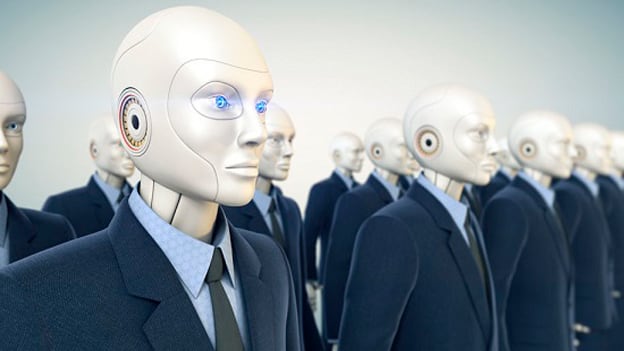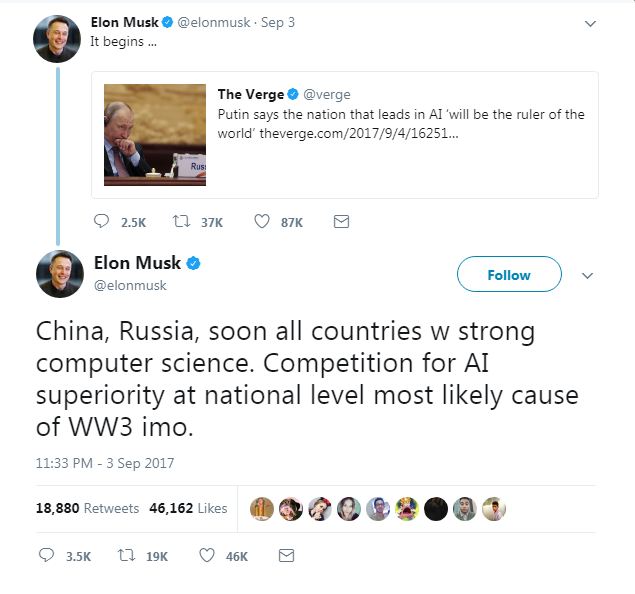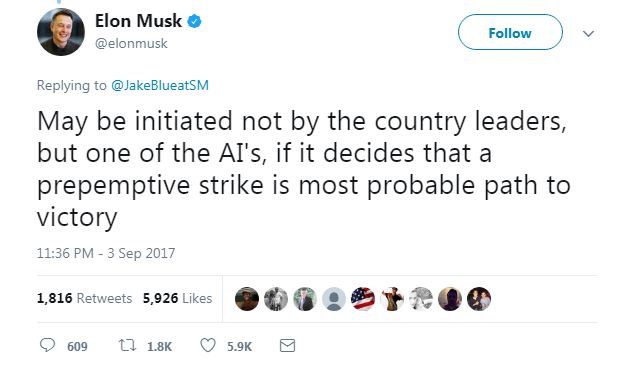"AI is our biggest existential threat” – Elon Musk

It has to come and it will!
This is about the third World War — the idea is not to generate fear of any kind, but it is about warming up to the fact the impending third World War will most likely not be a military conflict, but more of an aftermath of the Fourth Industrial Revolution — a contest for AI dominance.
We are amidst this fourth industrial revolution. We are all experiencing the impact of this insurrection in various spheres of our lives and at the same time, we are anticipating the changes it will cause in the coming future. The possibilities are endless, the impact will be multitudinous and the significance will be exorbitant.
But the starkest element of the 4IR is Artificial Intelligence and this has the potential to transfigure and metamorphose the future at an unprecedented rate. This technology will mutate businesses, societies, economies and our very existence. And this is what Elon Musk, in a recent tweet stated —“Competition for AI superiority at national level most likely cause of WW3 in my opinion”. And a later tweet by Musk stating, “It may be initiated not by the country leaders, but one of the AI's, if it decides that a pre-emptive strike is most probable path to victory.”


This entire episode of tweets was in response to Vladimir Putin's (Russia’s President) open lesson to students where he said that “Artificial intelligence is the future, not only for Russia, but for all humankind. It comes with colossal opportunities, but also threats that are difficult to predict. Whoever becomes the leader in this sphere will become the ruler of the world.”
But this is not the first time we are looking at such statements by Musk. Earlier on too, Musk had stressed on regulating AI and has stated that "AI is a rare case where I think we need to be proactive in regulation than reactive." Elon has proactively been highlighting that management of artificial intelligence is required as it can cause a 'fundamental risk to the existence of human civilization.' These regulations will prevent 'deep intelligence in the networks’ from starting wars by manipulating information; and that all governments need to comprehend the risks associated with AI technology’s proliferation.
Even tech giants – who, themselves have been involved in the growth of AI like FB etc. have deliberated on this topic.
Although many claim that AI and its developments will bring out considerable improvement in people's lives, Musk has been very vocal about his concerns over the future of AI as “development of robots will cause huge disruption to jobs and believes people should have a universal basic income to protect them.”
While many agree that such technologies will alter the workplace and will reduce jobs, according to McKinsey Global Institute’s report, A future that works: Automation, employment, and productivity, “About half of all the activities people are paid to do in the world’s workforce could potentially be automated by adapting currently demonstrated technologies. That amounts to almost $15 trillion in wages. And the activities most susceptible to automation are physical ones in highly structured and predictable environments, as well as data collection and processing.” The same report further reveals that “While less than 5 percent of all occupations can be automated entirely using demonstrated technologies, about 60 percent of all occupations have at least 30 percent of constituent activities that could be automated.”
About half the activities people are paid almost $15 trillion in wages to do in the global economy have the potential to be automated by adapting currently demonstrated technology — McKinsey Global Institute
In India, the use of AI is rampant too as more and more organizations are either empowering their product stacks through automation or leveraging automation to streamline their operations. Recently, TCS launched Ignio, a neuroscience-based self-learning platform, an enterprise cognitive automation leader for IT operations that combines enterprise contextual intelligence and binds together disparate, but interconnected business applications and their underlying infrastructure to drive smart decisions and perform actions autonomously. It also helps IT to determine the likely impact on infrastructure or business before changes are made to the environment.
While on the other hand, State Bank of India (SBI), the largest public sector bank in India, has launched its own chatbot/Intelligent Assistant SIA (SBI Intelligent Assistant) for handling customer queries and for guiding them through its range of retail products and services. This has been launched in efforts to streamline the bank’s operations by identifying key work processes to be transferred to robots.
With a significant mismatch of skills in the global workforce, escalating youth unemployment and a reduction in the number of job seekers with critical skills, the path for automation is laid. However, although automation will definitely lead to considerable economic and social disruption, this will not happen for at least another 30 to 50 years — it depends on us to decide the ways in which AI will transform the world.
















